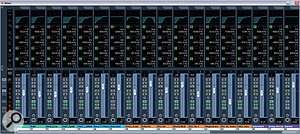I've heard a lot about high-pass filtering tracks to reduce clutter at mixdown, but not as much about low-pass filtering in this context. Would mixes suffer or benefit from doing the same at the opposite end? For example, would it be easier to bring out 'air' in a vocal if other parts were low-passed?
Via SOS web site
SOS contributor Mike Senior replies: Particularly in small-studio environments where the low-frequency monitoring fidelity is questionable, there's a lot to be said for high-pass filtering in a fairly systematic way to head off problems at mixdown. However, widespread low-pass filtering offers fewer benefits, simply because so many instruments in a mix will have harmonics and noise components that extend right up the spectrum. In practice, I find peaking/shelving cuts are, therefore, more appropriate for dealing with typical mixdown tasks, such as frequency-masking problems. Yes, in theory you could make your lead vocal sound airier by low-pass filtering the other parts, but you'd still have to consider how the mix as a whole will sound during moments when the vocal isn't active, so achieving an airy vocal in practice isn't usually as simple as this. Although fairly systematic high-pass filtering is very sensible in home-studio mixing, as you can see in this screenshot from a recent Mix Rescue project, it's rarely beneficial to apply low-pass filtering in a similar way.
Although fairly systematic high-pass filtering is very sensible in home-studio mixing, as you can see in this screenshot from a recent Mix Rescue project, it's rarely beneficial to apply low-pass filtering in a similar way.
Having said that, there's nothing wrong with low-pass filtering if you really want to kill the high frequencies of an instrument for balancing reasons. I would most commonly do this with amped instruments, such as electric guitars, which are capable of contributing a lot of undesirable amplifier noise in the top two octaves of the audible spectrum. However, this has to be evaluated on a case-by-case basis, because it's very easy to dull the overall mix if you're not careful.
